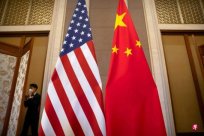According to the Russian business newspaper website reported on February 29, Chinese regulatory agencies have implemented restrictions on opening and opening measures on the accounts of Shanghai Weifan Company, a quantitative investment fund.This is another action taken by the relevant departments for funds engaged in high -frequency transactions.
China Financial Futures Exchange said on February 28 that it restricted the opening of Shanghai Victoria's Private Equity Fund Management Co., Ltd. and the actual accounts related accounts related accounts related accounts.
Zhongjin's statement states that the company and the controller actually "use the unreasonable means to avoid the exchanges' trading limit system".
It is reported that the measures taken by Shanghai Victorian Company are another signs of recently paying attention to quantitative fund transactions by relevant Chinese departments.Most of these funds are engaged in high -frequency algorithm transactions, and investment decisions are automatically made based on mathematical models.It is said that Shanghai Veywan is one of the most active quantitative funds in China.
Report also said that last week, the Shanghai and Shenzhen Stock Exchange implemented a suspension or restriction of trading measures to the quantitative fund giant Ningbo Lingjun Investment Management Partnership.Relevant exchanges report pointed out that its approach constitutes a programmatic transaction that "automatically generates or issued transaction instructions through computer programs to affect the security or normal transaction order of the institute."
Earlier, some other quantitative funds have also been used in short -term transaction restrictions.
The China Securities Regulatory Commission said on February 28 that the agency guided the joint spot supervision linkage of the Stock Exchange and the CICC.Violations and regulations.
Yang Tingwu, deputy general manager of Tongheng Investment Management Co., Ltd. believes that the regulatory agency releases a clear signal, that is, funds shall be managed by companies passing through long -term investment rather than short -term transactions.Relevant Chinese departments have recently introduced other measures to strengthen trading supervision to boost the stock market.
According to the Hong Kong South China Morning Post website reported on March 1, the best performance in the Chinese stock market in more than ten months, investors believe that the stock market will maintain momentum under policy support
It is reported that in China, the largest monthly increase in the stock market after the epidemic has boosted the fragile confidence of investors. Some fund managers and analysts expect other policies to support it and believe that the stock market is expected to rise further.
In February, the CSI 300 Index rose about 9.3%, the largest monthly increase since November 2022.
A fund manager of HSBC Jinxin Fund said in the report at the end of February: "The market's continuous reaction to policy measures is positive. Active policy signals and the previously -selling phenomenon affected by emotions have further increased and expanded by the market performance.Space.
Reported that before Beijing increased its efforts to boost emotions and support the market, the stock market rose significantly.
At the same time, in order to support real estate and other fields, the People's Bank of China exceeded expectations in February to reduce the loan market quotation interest rate (LPR) of more than 5 years, and also reduced the deposit reserve ratio of financial institutions.
Industry insiders believe that after the recent series of measures, more policies will be introduced; as a large number of selling can be relieved, if the company's income is better than expected, buying may continue to increase.(Compiled/Li Ran Zheng Guoyi)



